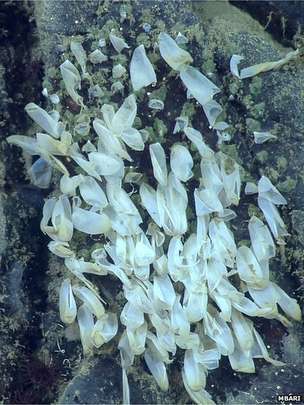In a feat that surely made good use of all eight arms, an octopus revealed a
new secret of deep sea life when ecologists observed her record-breaking behaviour from a robotic submarine.
This doubles the longest brooding time ever seen in the animal kingdom,
giving embryos time to develop in the cold.
The discovery, published in the journal PLOS One,
was made in a canyon 1.4km beneath the Pacific, off California.

Dr Bruce Robison led the research at the Monterey Bay Aquarium Research Institute (MBARI).
He told BBC News his team had stumbled upon the plucky mother in the days before she settled down
and glued her eggs to the rock face.
She was heading, slowly, for a known brooding site.
By looking at characteristic scars in one of her eight armpits,
the team identified the same octopus on the next dive, one month later.
"The first time that we dropped back down...
and realized that she had gone up and laid a clutch of eggs, it was very exciting,"
Dr Robison said. "We knew that we had the beginning."
"No-one had ever had the good fortune to come upon the beginning of a brooding period."
For the next four and a half years, the team paid the devoted cephalopod 18 more visits,
thanks to multimillion-dollar remote diving vehicles equipped with cameras, robotic arms,
and laser lights to make physical measurements.
"Each time we went down it was more of a surprise," Dr Robison said,
"because we found her there again and again and again, past the point that anybody expected she'd persist.
"It got to be like a sports team we were rooting for. We wanted her to survive and to succeed."
Octopus and eggs were all still firmly in place in September 2012. By October,
the same month that David Cameron urged his government to support same sex marriage and the first
Puss in Boots spin-off landed, she had disappeared.
Empty egg cases littered the scene of her encampment.
Four-year fast?
The octopus probably died shortly after completing her vigil, according to Dr Robison.
The brooding period typically takes up the final quarter of a female octopus's life.

"She has only one job once those eggs are deposited," he said.
He added she quite possibly ate nothing for the whole 53 months.
"Everything we know suggests she probably didn't eat," Dr Robison said.
Most octopuses do not feed while brooding, he explained, and in countless dives his team had
"never seen a clutch of eggs untended".
The only time the cameras saw this particular devoted mother pay any attention
to the crabs or shrimps that strayed nearby - normally a square meal for an octopus - was when she batted
them away from her 150 precious eggs.
Even when the team used one of the submarine's appendages to offer her a snack,
they were resolutely ignored.
Kerry Perkins, an aquarist at the Sea Life aquarium in Brighton, said a four-year fast
was a possibility, but noted that the octopus may have got nutrients from unlaid eggs or very occasional,
unobserved titbits.
"They're exceptionally good mothers," she said. "It is very, very cold water and
they're not moving much, so their metabolic rate would be pretty low - but still, you'd think in four and a half years
you'd probably have to have a snack at some point."
Eclipsed shrimp

Ms Perkins said she was "quite amazed" by the findings,
which contribute to our still very rudimentary understanding of these deep-sea dwellers.
"They're still very much the aliens of the sea."
Dr Robison believes the icy temperature at these depths - about 3C -
is what governs the extraordinary brooding routine.
"The low temperature slows everything down," he said.
A low metabolism allows the mother to survive on little or no food, while she protects the eggs and flushes water over them,
keeping their oxygen supply up as they gradually develop.
The previous record for the longest known brooding time was 20 months,
and belonged to a giant red shrimp.